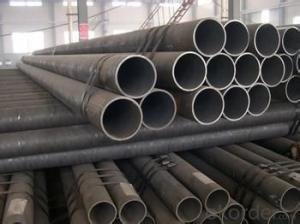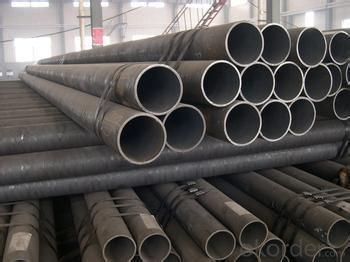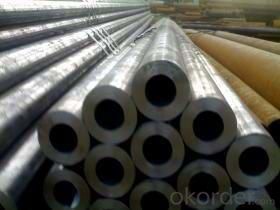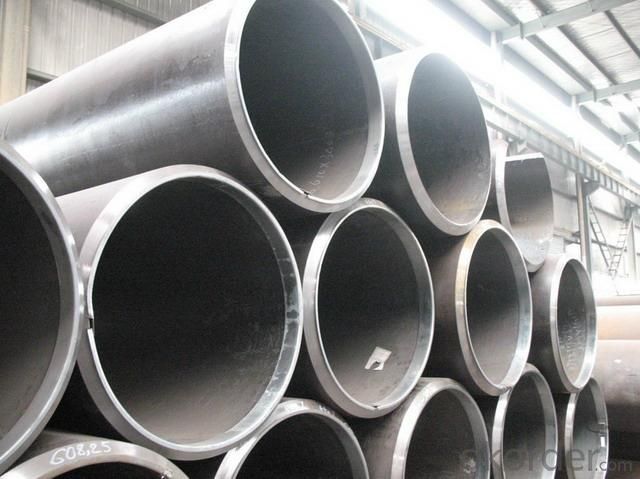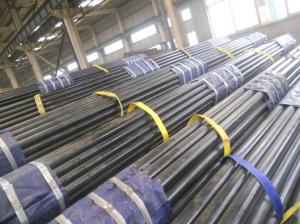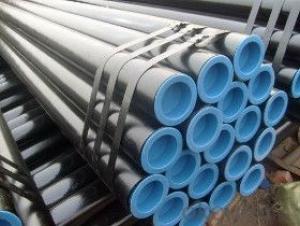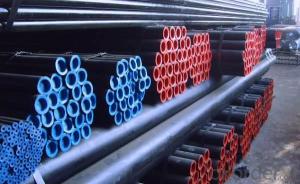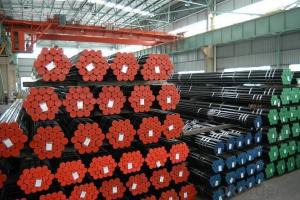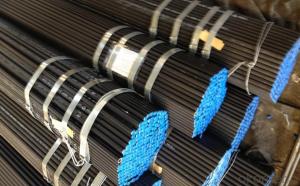High manufacturing accuracy Seamless Black Steel Pipes API5L,GB,ASTM,ASME
- Loading Port:
- Tianjin
- Payment Terms:
- TT or LC
- Min Order Qty:
- 22 m.t.
- Supply Capability:
- 333 m.t./month
OKorder Service Pledge
OKorder Financial Service
You Might Also Like
Product Description:
1. Commodity Name: Seamless steel pipe
2. Standard: API,GB,ASTM,ASME,DIN
3. Quality grade: 10#, 20#, A106B, A53B, API 5L B, Q235, Q345, ST37-2, ST 45, ST52.etc.
4. Dimension:
OD: 1/2"-24"
WT: 2.5-80mm, SCH10~SCH40~XXL
length: 5.8m,6m,8m,9m,12m
5. Technique: Hot Rolled/Cold Rolled/ Cold Drawn
6. application
carbon seamless steel pipes are widely used in gas, water and oil, transpotation;constructions;Bridge,highway,windows of model steel door; building materials;fences;heating facilities Fluid Pipe;conduit pipe,scaffolding pipe.etc.
7. Payment Terms: L/C D/A D/P T/T
8.packing and shipment
Packaged in bundles,as per customers' requirements, it can also bepackagesd as beveled ends, typed marking, black painting, plastic caps protection,woven bags packing
For 20" container the max length is 5.8m; For 40" container the max length is 12m. other options are available based on customer requests. Please discuss when placing orders.
9. Surface: painted with varnish;
10. Plastic caps at ends.
11. Tolerance: OD +1%/-1%
WT +12.5%/-10%
PICTURES:
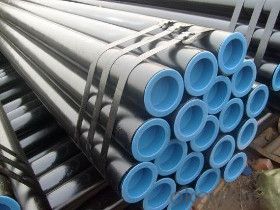
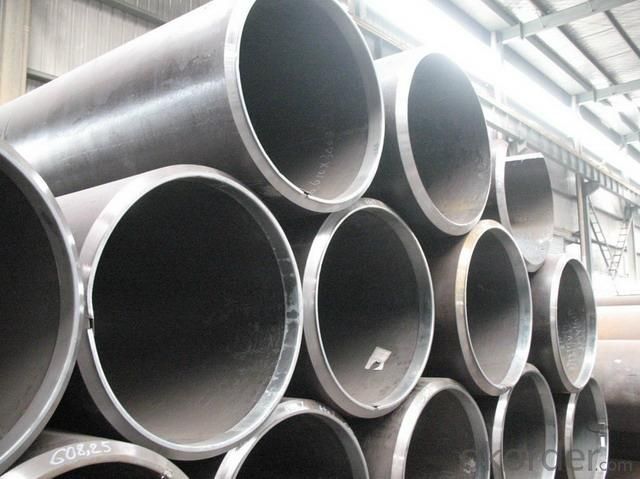
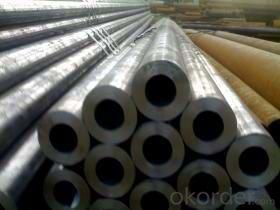
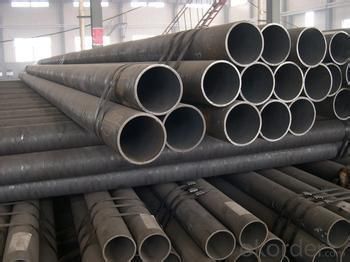
- Q: How are steel pipes protected against electrolytic corrosion?
- Steel pipes are protected against electrolytic corrosion through various methods such as applying protective coatings, using sacrificial anodes, implementing cathodic protection systems, or utilizing corrosion inhibitors. These measures help to prevent the flow of electric current and the subsequent corrosion caused by electrolysis, ensuring the longevity and integrity of the steel pipes.
- Q: What are the different types of steel pipe coatings for marine applications?
- There are several types of steel pipe coatings commonly used for marine applications, including epoxy coatings, polyurethane coatings, and fusion bonded epoxy (FBE) coatings. These coatings are designed to protect the steel pipe from corrosion and provide resistance to marine environments. Epoxy coatings are known for their excellent adhesion and chemical resistance, while polyurethane coatings offer enhanced abrasion resistance. FBE coatings are highly durable and provide excellent corrosion protection. The choice of coating depends on the specific requirements of the marine application and the level of protection needed.
- Q: What is the role of steel pipes in power plants?
- Steel pipes play a crucial role in power plants as they are used for transporting various fluids, such as water, steam, and fuel, throughout the facility. These pipes are designed to withstand high temperatures, pressure, and corrosive environments, ensuring a safe and efficient operation of power generation equipment. They facilitate the circulation of cooling water, carry steam to drive turbines, and transport fuel to boilers, helping to generate electricity in power plants.
- Q: Seamless steel tube with the tube with what is the difference?
- Seamless pipe can withstand ultra-high pressure, of course, its wall thickness will increase, which needs to be designed according to pressure requirements. It is generally used in high-pressure oil pipes, boiler tubes and other high temperature and high pressure equipment. There are also seamless tubes for structural purposes, depending on the design requirements.
- Q: Are steel pipes suitable for transporting gas?
- Yes, steel pipes are suitable for transporting gas. Steel pipes are known for their durability and strength, making them ideal for transporting gas safely over long distances. They are resistant to corrosion and can handle high pressure, making them a reliable choice for gas transportation.
- Q: Hot galvanized steel pipe for use?
- 1, galvanized layer uniformity: steel pipe sample in copper sulfate solution immersion 5 times continuously, must not turn red (copper plated)2, surface quality: galvanized steel pipe surface should be complete galvanized layer, must not have plating on the black spots and bubbles exist, allow little rough surface and local zinc tumor exists.3, galvanized layer weight: according to the requirements of the buyer, galvanized steel pipe can be used for zinc layer weight determination, its average value should be not less than 500g/ square meters, and any sample shall not be less than 480g/ square meters.
- Q: What are the different grades of steel used for manufacturing pipes?
- The different grades of steel used for manufacturing pipes include carbon steel, alloy steel, stainless steel, and duplex steel.
- Q: How are steel pipes used in the renewable energy industry?
- Steel pipes are commonly used in the renewable energy industry for various applications. They are used to transport fluids, such as water or steam, in geothermal power plants. Steel pipes are also used in solar thermal power plants for transferring heat transfer fluids. Additionally, steel pipes are utilized in the construction of wind turbine towers, providing structural support for the turbines. Overall, steel pipes play a vital role in the renewable energy industry by facilitating the efficient and reliable operation of different renewable energy technologies.
- Q: Can steel pipes be used for irrigation pumps?
- Yes, steel pipes can be used for irrigation pumps. Steel pipes are commonly used in irrigation systems due to their durability, strength, and resistance to corrosion. They are ideal for transporting water from the pump to the irrigation system, ensuring efficient water distribution for agricultural purposes.
- Q: Are steel pipes resistant to fire?
- Yes, steel pipes are highly resistant to fire due to their high melting point and ability to withstand intense heat and flames.
Send your message to us
High manufacturing accuracy Seamless Black Steel Pipes API5L,GB,ASTM,ASME
- Loading Port:
- Tianjin
- Payment Terms:
- TT or LC
- Min Order Qty:
- 22 m.t.
- Supply Capability:
- 333 m.t./month
OKorder Service Pledge
OKorder Financial Service
Similar products
Hot products
Hot Searches
Related keywords
